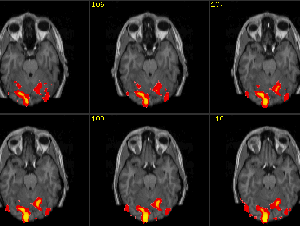Debate grows over fMRI scans
Temporal Sequence of FMRI scans (Image: csulb.edu)
The use of brain scanning technology has been growing as a tool to decode the inner workings of the mind, but some scientists fear that the simplistic media hype is dramatically overstating findings, leading to major misunderstanding.
Scientists caution that one of those advancements, Functional Magnetic Resonance Imaging, or fMRI, technology may provide a window into the brain, but in no way provides concrete evidence about how the brain works. fMRI promises to map and discover new patterns of brain activity that were previously inaccessible.
"The Takeaway" talks to Jonah Lehrer, author of "Proust Was a Neuroscientist" about the brain scanning backlash.
According Lehrer, "While fMRI is very good at measuring certain types of brain activity, it’s very bad at measuring other types of brain activity. And so this technology that seems like a window to the soul — it seems like this the black box of the brain has finally been broken open — it’s actually not a window, or if it is a window, the glass is very, very dirty."
Lehrer says that there are a lot of reports about how this technology can make lots of predictions about what people will do in the future, or what they’re thinking right now, but these reports are oversimplifying the research.
"The Takeaway" is PRI’s new national morning news program, delivering the news and analysis you need to catch up, start your day, and prepare for what’s ahead. The show is a co-production of WNYC and PRI, in editorial collaboration with the BBC, The New York Times Radio, and WGBH.
More at thetakeaway.org
